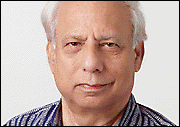

![]()
Other Views


![]()
Other Views
FOR those waiting for early restoration of democracy in Pakistan, the news from Islamabad is not very encouraging. Gen. Parvez Musharraf, who dismissed the civilian government of Nawaz Sharif and took power on Oct. 12, has let it be known that he is in no hurry to hold elections. India, Pakistan have
only peace as an option"I will do things as required by Pakistan and not by the world. I will leave when I achieve what I have promised to the people of Pakistan, or when the people of Pakistan want me to leave," he reportedly told a group of overseas Pakistanis during a recent visit to the United Arab Emirates.
The Dubai-based Khaleej Times newspaper quoted Musharraf as saying in Abu Dhabi that he was under no obligation to the world to give a definite commitment on when the army would return to the barracks.
The most optimistic forecast from Islamabad is that Musharraf would stay in power at least three years, then consider the democratic alternative.
Deadlines set by military dictators for return to democracy get easy extensions, and for a good reason. In the case of Musharraf, what are the possibilities? Either he will succeed in what he has set out to do for Pakistan or he won't. If he succeeds, that would make him popular among his people and they would want him to continue. If he fails, he would be reluctant to dismount the tiger he is riding because the tiger then could eat him up.
For those who have watched Pakistan over the years, the military coup was no great surprise. For almost half of the 52 years since independence, the country has been ruled by the army. For the remainder, the military was the real power behind the scene. When Musharraf found Nawaz Sharif getting too big for his boots, with just one stroke of a pen (he did not have to fire even a shot), he blew away the fig leaf of democracy and placed the country directly under army rule.
Is this simply a replay of an old act? Not quite. Because since the last time it happened, Pakistan has acquired nuclear weapons. That adds a new and ominous dimension to the scenario.
Who has the finger on the nuclear button? Certainly not Nawaz Sharif. The former prime minister is being held in captivity, charged with sedition and high treason, which may spell the hangman's noose. He couldn't possibly be hanging on to the black brief case containing nuclear coordinates.
Apart from the army and the off-and-on civilian governments, there are two other centers of power in Pakistan that cannot be ignored. One: the fundamentalists, represented by such organizations as Harkat-ul-Ansar -- recently renamed as Harkat-ul-Mujahideen, Lashkar-e-toeba and Hizbul Mujahideen. The other: the all powerful ISI, the inter-services intelligence agency of Pakistan, which is stated to be a government unto itself. Neither of them seems to have lost any steam as a result of the coup.
It is widely believed that it was Musharraf and the ISI and the fundamentalists who planned and executed the Kargil operation in Kashmir, which brought India and Pakistan dangerously close to an all-out war.
Since taking power, Musharraf has assembled a cabinet of advisers who are perceived in New Delhi as hawks and hardliners. Lashkar-e-toeba, branded as a terrorist organization by the State Department, has announced plans for holding a mammoth gathering of about one million near Lahore and has declared its intention of stepping up terrorist activity in Kashmir.
THESE developments are bound to heighten tensions. Given the nuclear scenario, peace in South Asia is no more a bilateral concern of India and Pakistan. So what, if anything, can the world do to change things?
For one, Pakistan's economy is in dire straits. Seventy percent of the budget goes to the military and payment of debt. The foreign exchange reserves are so low that only five weeks worth of import money is left in the kitty. If the International Monetary Fund and the World Bank do not reschedule payments, Pakistan can easily default. So Musharraf needs the cooperation of the world community as much as it needs him. But an unstable Pakistan is not in the interest of peace. So nobody wants to push Pakistan into a corner.
As far as India and Pakistan are concerned, prospects of a settlement right now are not bright. But both countries know that they have no choice but to keep seeking the road to peace. War is no longer an option.
Inder Kapur is a former journalist from New Delhi, who now
lives in Honolulu and writes frequently about the region.